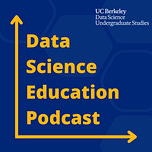Access the full transcript for this episode
“I would recommend double majoring with a different degree, because I think while data science by itself is a very, very useful and versatile degree, I think being able to apply it to a particular domain overall makes you a better statistician, or economist, or historian, right?”
—Alan Liang
In the final episode of the season, we explore the pivotal role students played in shaping Berkeley’s undergraduate data science program. We sat down with three alumni — Alan Liang, Vinitra Swamy, and Gunjan Baid — who were instrumental in building the foundations of data science education at Berkeley. They reflect on their unique contributions, including developing curriculum, infrastructure, and interdisciplinary initiatives, and how those experiences shaped their career trajectories. From Alan’s insights into teaching technical concepts, to Vinitra’s innovative work on scaling Jupyter infrastructure, and Gunjan’s efforts on connector courses and technical systems, we highlight the long-lasting impact of student-led innovation.
“I really loved the experience here of being a graduate student….there's a very collaborative atmosphere that people are always super excited about working on what they're working on, and that passion is what really drew me to the PhD as well. Like, the excitement to work on ideas that might be a bit too risky, that might be a little bit out there, a bit crazy, but you know, trying to get it to work and to work alongside people that are willing to put in the late nights and early mornings, because they want to, not because someone is forcing them to.”
—Vinitra Swamy
“Really dig deep and make sure you understand the details of a problem that you're working on. This still comes up a lot for me, but if something seems like it's off, if you're training a model and something looks funky, it's probably because something is off. And I think it's easy to kind of brush over the details and kind of gloss over that. But more often than not, really kind of getting your hands dirty, peeling back the layers, looking at the data, and going deep on a problem is how you'll make the most progress.”
—Gunjan Baid












Share this post